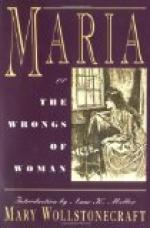“After these remarks, I am ashamed to own, that I was pregnant. The greatest sacrifice of my principles in my whole life, was the allowing my husband again to be familiar with my person, though to this cruel act of self-denial, when I wished the earth to open and swallow me, you owe your birth; and I the unutterable pleasure of being a mother. There was something of delicacy in my husband’s bridal attentions; but now his tainted breath, pimpled face, and blood-shot eyes, were not more repugnant to my senses, than his gross manners, and loveless familiarity to my taste.
“A man would only be expected to maintain; yes, barely grant a subsistence, to a woman rendered odious by habitual intoxication; but who would expect him, or think it possible to love her? And unless ‘youth, and genial years were flown,’ it would be thought equally unreasonable to insist, [under penalty of] forfeiting almost every thing reckoned valuable in life, that he should not love another: whilst woman, weak in reason, impotent in will, is required to moralize, sentimentalize herself to stone, and pine her life away, labouring to reform her embruted mate. He may even spend in dissipation, and intemperance, the very intemperance which renders him so hateful, her property, and by stinting her expences, not permit her to beguile in society, a wearisome, joyless life; for over their mutual fortune she has no power, it must all pass through his hand. And if she be a mother, and in the present state of women, it is a great misfortune to be prevented from discharging the duties, and cultivating the affections of one, what has she not to endure?—But I have suffered the tenderness of one to lead me into reflections that I did not think of making, to interrupt my narrative—yet the full heart will overflow.
“Mr. Venables’ embarrassments did not now endear him to me; still, anxious to befriend him, I endeavoured to prevail on him to retrench his expences; but he had always some plausible excuse to give, to justify his not following my advice. Humanity, compassion, and the interest produced by a habit of living together, made me try to relieve, and sympathize with him; but, when I recollected that I was bound to live with such a being for ever—my heart died within me; my desire of improvement became languid, and baleful, corroding melancholy took possession of my soul. Marriage had bastilled me for life. I discovered in myself a capacity for the enjoyment of the various pleasures existence affords; yet, fettered by the partial laws of society, this fair globe was to me an universal blank.




